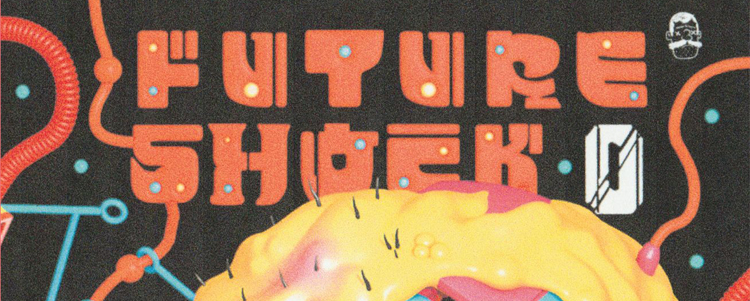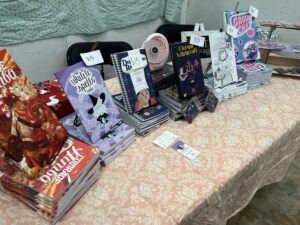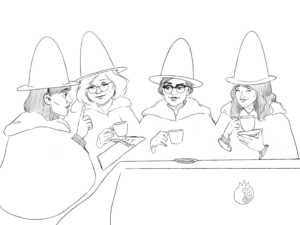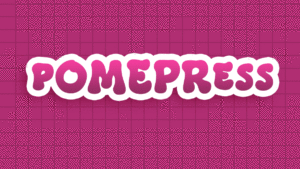Much like fish and wildebeest, indie cartoonists often travel in spontaneously-formed groups to help ensure their mutual survival. These groups are called “anthologies.” Anthologies have some major advantages for cartoonists over working solo: they appeal to a potentially-broader audience, they lighten the burden on individual creators, and they impart a sense of camaraderie to what can be a very lonesome practice. Anthologies also have some real advantages for you, the reader: with their easy-to-digest format of short stories, they can introduce you to a multiplicity of perspectives and an array of fresh talent. In this vein, let me recommend Future Shock Zero as one of 2015’s best indie anthologies and a great sampling of the contemporary scene.
Future Shock began in 2012 as a retro continuation of an older style of pamphlet-size anthologies. This heritage includes the otherworldly visions of Heavy Metal and the weed-hazed gags of Zap Comix and editor Josh Burggraf directly claims both as influences. While Burggraf has always billed Future Shock as a sci-fi anthology, most contributors seem to have taken this as more of a friendly suggestion than a strict requirement. The speculative fiction that readers might expect from the book’s title (a reference to futurist Alvin Toffler) is mostly absent and technology sometimes feels added as a courtesy (like taking your shoes off when entering an especially tidy friend’s house). Instead, Future Shock’s common thread seems to be these artists’ shared appreciation for freeform nonsense and an unburdened imagination. If drawing is a way of thinking, then the stories in Future Shock form a collective psychedelic consciousness, oscillating between bouts of giggling and paranoia as the absurdity becomes more or less comfortable. Like any good stoner, the collective also takes occasional breaks to stare at cool patches of color, but I’d hazard that these cartoonists were more under the influence of art school than weed. Drawing styles vary, but experimentation and abstraction are prominent over traditional, pulp sci-fi representation. Occasionally this means that the visual language is more interesting than the story being told.
Future Shock Zero is the latest release in the series, after a hiatus of almost two years and a switch between publishers (the last issue, Future Shock 7, came out in in early 2014 from Birdcage Bottom Books). It is meant (I hope!) to be a sort of reboot, but would just as well function as the Future Shock‘s capstone. Zero is almost three times the length of previous issues and features not only all the artists from issues 1 and 7, but a few new names as well. Picking favorites is hard. The book is bursting with talent and every cartoonist in it is worth a sentence or two (especially on the internet, where ink is free). But, I’ll limit this article to a few highlights to whet the appetite:
Hybrid by Lauren Alberts is a technicolor nightmare about the lifecycle of a parasite spread via bottled water. Her pseudo-naive drawings are cheery but also disturbingly alien, enhancing the tale’s morbid fascination. I would buy literally any panel of this comic as a painting.
Alex Degen contributes another great segment to his on-going Mind Hunters series. These silent comics follow the capers of two masked Robin Hood figures as they steal brains from surreal, heavily-guarded mansions in a dystopian future. Probably? Containing exactly zero exposition or dialogue, Mind Hunters is opaque but the mystery is part of the fun.
Projecting is a collaborative piece, written by Pete Toms and drawn by Aleks Sennwald. It features a future blogger projecting into a robot body on a long-abandoned Earth where the wildlife is “still infected with ads”. Firmly seated in the tradition of writing about the future to address the present, Toms’ caustic wit makes the exploration of our own folly almost too enjoyable.
But here’s the great thing about a collection like Future Shock Zero: while the three comics I picked may not be your favorites, you will almost certainly like something in here. And you may even discover your new favorite cartoonist.
Future Shock Zero can be purchased from Retrofit Comics but back issues seem to be out of print. Sorry. (They were pretty good). As for the cartoonists highlighted above, more work from Lauren Alberts, Andrew Degen and Pete Toms can be found at their respective websites.
All images via Retrofit Comics’s Future Shock Zero.










